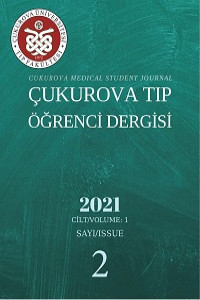Abstract
Gebelik ve doğum sonrası bir aylık süreçte belirtileri ortaya
çıkmaya başlayabilen peripartum depresyon (PPD),
annelerin bebeklerine ve hayata karşı olumsuz duygu ve
düşüncelerini içeren psikiyatrik bir bozukluktur. Dünya
genelinde prevalansı yaklaşık olarak %6.5-20 aralığında,
Türkiye’de ise %23.8 olan postpartum depresyon,
yaygınlığı sebebiyle önemli bir halk sağlığı sorunudur.
Annede nörobiyolojik değişiklikler sonucu ortaya çıkan
azalmış ilgi, değersizlik düşünceleri, iştah değişiklikleri,
kararsızlık, konsantrasyon yeteneğinde azalma ve uyku
düzeninde değişimler gibi temel bulgular görülmektedir.
Hem psikolojik ve sosyal faktörler hem de gebelik, doğum
ve emzirme süreci hastalığın görülmesini veya şiddetini
etkileyen unsurlardandır. Gebelik ve postpartum dönemde
östradiol, progesteron ve kortizol hormonlarının
salınımındaki değişimin hastalığın görülmesinde etkili
olduğu düşünülmektedir. Annede belirgin sıkıntılara sebep
olan nöropsikiyatrik fonksiyon bozukluklarına yol açan
PPD, ailenin tümünü etkileyen olumsuz sonuçlar doğursa
da tedavi edilebilir bir bozukluktur. Tedavide bozukluğun
şiddetine göre karar alınır, şiddetli PPD hastalarının
(özkıyım veya infantisid düşüncelerine sahip hastalar)
hastaneye yatırılması gerekebilir.
Keywords
References
- 1. Selçuk MY, Usman MG, Oktay M, İstanbullu A, Özdemir Ö, Saraçoğlu F. Postpartum depresyonun gebelikte alınan kilo ve sosyodemografik faktörlerle ilişkisi. İnönü Üniversitesi Tıp Fakültesi Dergisi. 2012;19:256-63.
- 2. Payne JL, Maguire J. Pathophysiological mechanisms implicated in postpartum depression. Front Neuroendocrinol. 2019;52:165-80.
- 3. Mughal S, Azhar Y, Siddiqui W. Postpartum depression. In StatPearls [Internet]. Treasure Island, FL, StatPearls Publishing, 2021.
- 4. Fiala A, Švancara J, Klánová J, Kašpárek T. Sociodemographic and delivery risk factors for developing postpartum depression in a sample of 3233 mothers from the Czech ELSPAC study. BMC Psychiatry. 2017;17:104.
- 5. Arifin SRM, Cheyne H, Maxwell M. Review of the prevalence of postnatal depression across cultures. AIMS Public Health. 2018;5:260-95
Abstract
Peripartum depression (PPD), the symptoms of which
may begin to appear during pregnancy and postpartum one
month period, is a psychiatric disorder that includes
negative feelings and thoughts of mothers towards their
babies and life. Postpartum depression, which has a
prevalance in the range of 6.5-20% worldwide and 23.8%
in Turkey, is an important public health problem due to its
extensiveness. Key findings include decreased interest,
thoughts of worthlessnesss, changes in appetite,
indecisiveness, decreased ability to concentrate and
changes in sleep routine, which occur as a result of
neurobiological changes in the mother. Psychological and
social factors, as well as the processes of pregnancy, birth
and breastfeeding are factors that affect the occurrence
and/or severity of the disorder. The change in the release
of estradiol, progesterone and cortisol hormones during
pregnancy and postpartum period may affect the
occurrence of the disorder. PPD, which causes
neuropsychiatric dysfunction in the mother, is a treatable
disorder even though it has negative consequences
affecting the whole family. In the treatment, the decision
is made considering the severity of the disorder and severe
PPD patients which have thoughts of suicide and
infanticide may need to be hospitalized.
Keywords
References
- 1. Selçuk MY, Usman MG, Oktay M, İstanbullu A, Özdemir Ö, Saraçoğlu F. Postpartum depresyonun gebelikte alınan kilo ve sosyodemografik faktörlerle ilişkisi. İnönü Üniversitesi Tıp Fakültesi Dergisi. 2012;19:256-63.
- 2. Payne JL, Maguire J. Pathophysiological mechanisms implicated in postpartum depression. Front Neuroendocrinol. 2019;52:165-80.
- 3. Mughal S, Azhar Y, Siddiqui W. Postpartum depression. In StatPearls [Internet]. Treasure Island, FL, StatPearls Publishing, 2021.
- 4. Fiala A, Švancara J, Klánová J, Kašpárek T. Sociodemographic and delivery risk factors for developing postpartum depression in a sample of 3233 mothers from the Czech ELSPAC study. BMC Psychiatry. 2017;17:104.
- 5. Arifin SRM, Cheyne H, Maxwell M. Review of the prevalence of postnatal depression across cultures. AIMS Public Health. 2018;5:260-95
Details
| Primary Language | Turkish |
|---|---|
| Subjects | Clinical Sciences |
| Journal Section | Review |
| Authors | |
| Publication Date | December 30, 2021 |
| Published in Issue | Year 2021 Volume: 1 Issue: 2 |

